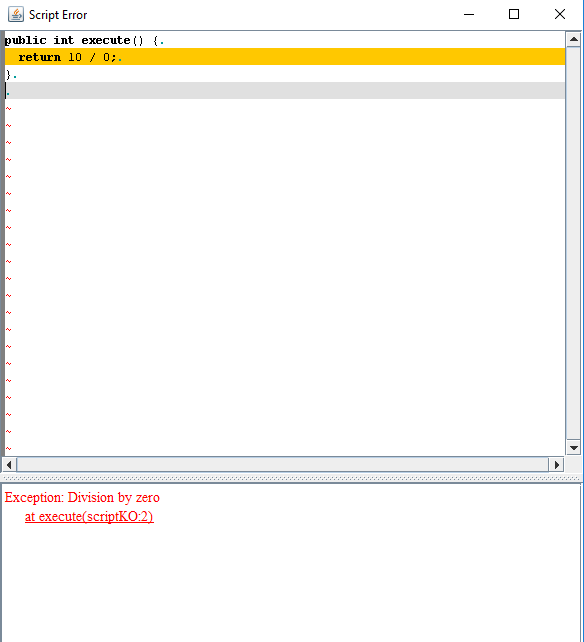Exceptions handling
By default exceptions encountered in the script will be rethrown as ScriptException. These exceptions may be encountered in several cases:
It is possible to show a Swing component which will show the exceptions in a code Editor[1]

Note that the
- While trying to Install a script
- While trying to find the script method when performing a direct invocation
- While running the script method
wrapper.logExceptions(true);By default exception messages will be send to the
err stream, but it is possible to control how the exceptions are logged by implementing the ScriptLogger interface and setting the logger to the wrapper by:wrapper.setScriptLogger(<the logger>);
Exception listener
One or several ScriptExceptionListeners can be added to the wrapper with:wrapper.addExceptionListener(<the listener>);The exception listener has three methods:
- The ScriptExceptionListener.notified(String, char, Throwable) method notifies the listener for any exception encountered during the execution of the script
- The ScriptExceptionListener.notifiedFirst(ScriptRuntimeException, char, String) method notifies the listener for the first exception encountered during the execution of the script. The provided
ScriptRuntimeExceptionallows to get the StackTrace with optionally only the script stack elements - The ScriptExceptionListener.aborted(String) method notifies the listener for an abort of the script
- The value ScriptExceptionListener.STATE_OK indicates that the script has not started or that it executed correctly
- The value ScriptExceptionListener.STATE_ABORTED indicates that the script has been aborted
- The value ScriptExceptionListener.STATE_ERROR indicates that the script has ancountered an error
STATE_OK. It is the responsability of the listener to implement correctly the notified, notifiedFirst, aborted, and resetState methods to be sure that the listener return its state correctly.
Type of exception
Thechar second argument in the notified and notifiedFirst methods is the type of exception, which can be:- ErrorType.COMPILE: for an exception which happened during the script compilation
- ErrorType.COMPILE_DEBUG: for an exception which happened during the script compilation in the debugging mode
- ErrorType.RUNTIME: for an exception which happened during the script execution
- ErrorType.RUNTIME_DEBUG: for an exception which happened during the script execution in the debugging mode
Showing exceptions in a code editor
Main Article: Swing utility classes
It is possible to show a Swing component which will show the exceptions in a code Editor[1]
You will need to have the
. To show the exceptions in a Swing component, just use the following:scriptHelperSwing.jar file in your ClasspathScriptWrapper<Script> wrapper = new GroovyScriptWrapper() { } ... SwingExceptionListener listener = new SwingExceptionListener(); wrapper.addExceptionListener(listener);Then the first exception encountered during the compilation or execution of the script will popup the following window:

Note that the
SwingExceptionListener handles correctly the getScriptState() method.Notes
- ^ You will need to have the
scriptHelperSwing.jarfile in your Classpath
×
![]()
Categories: api